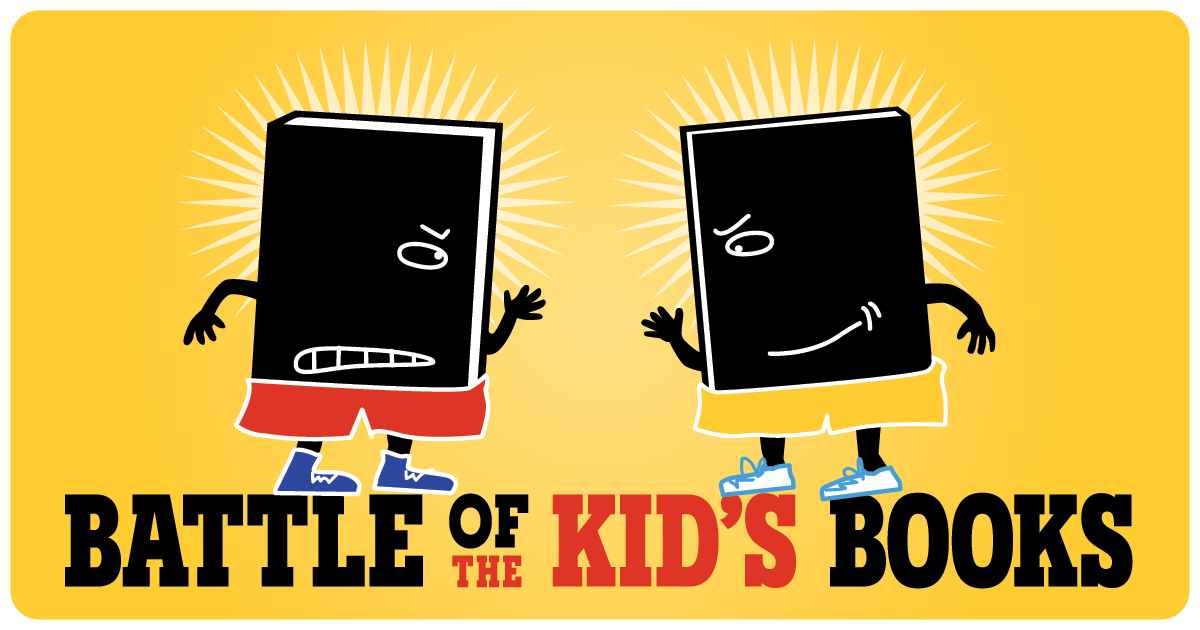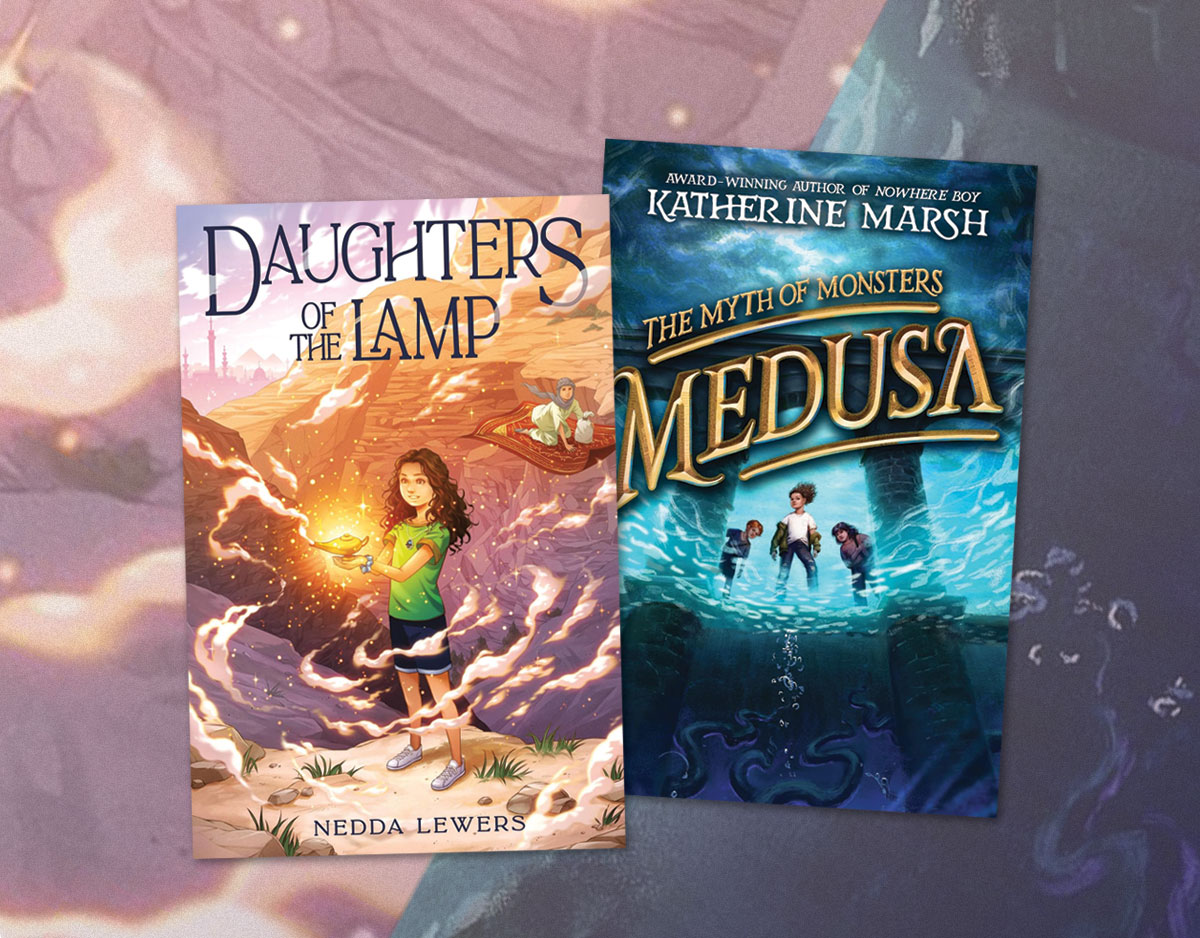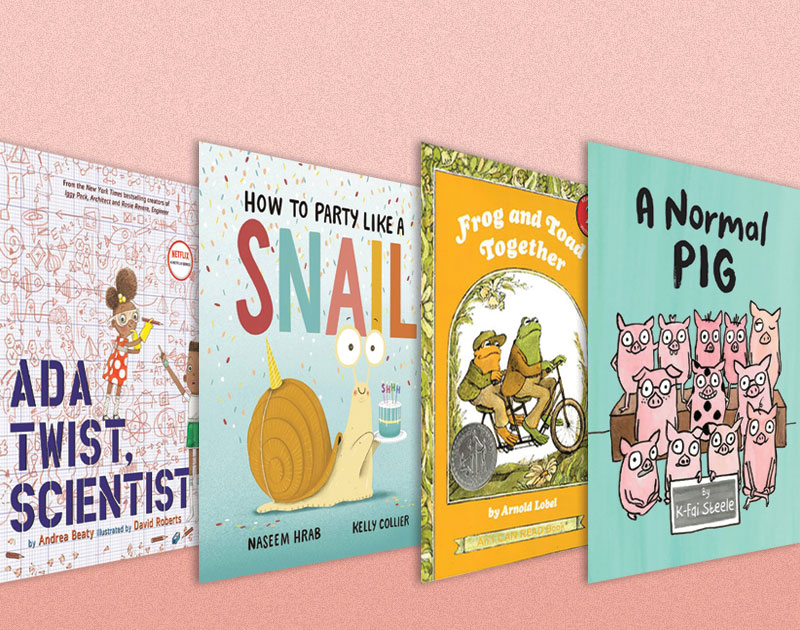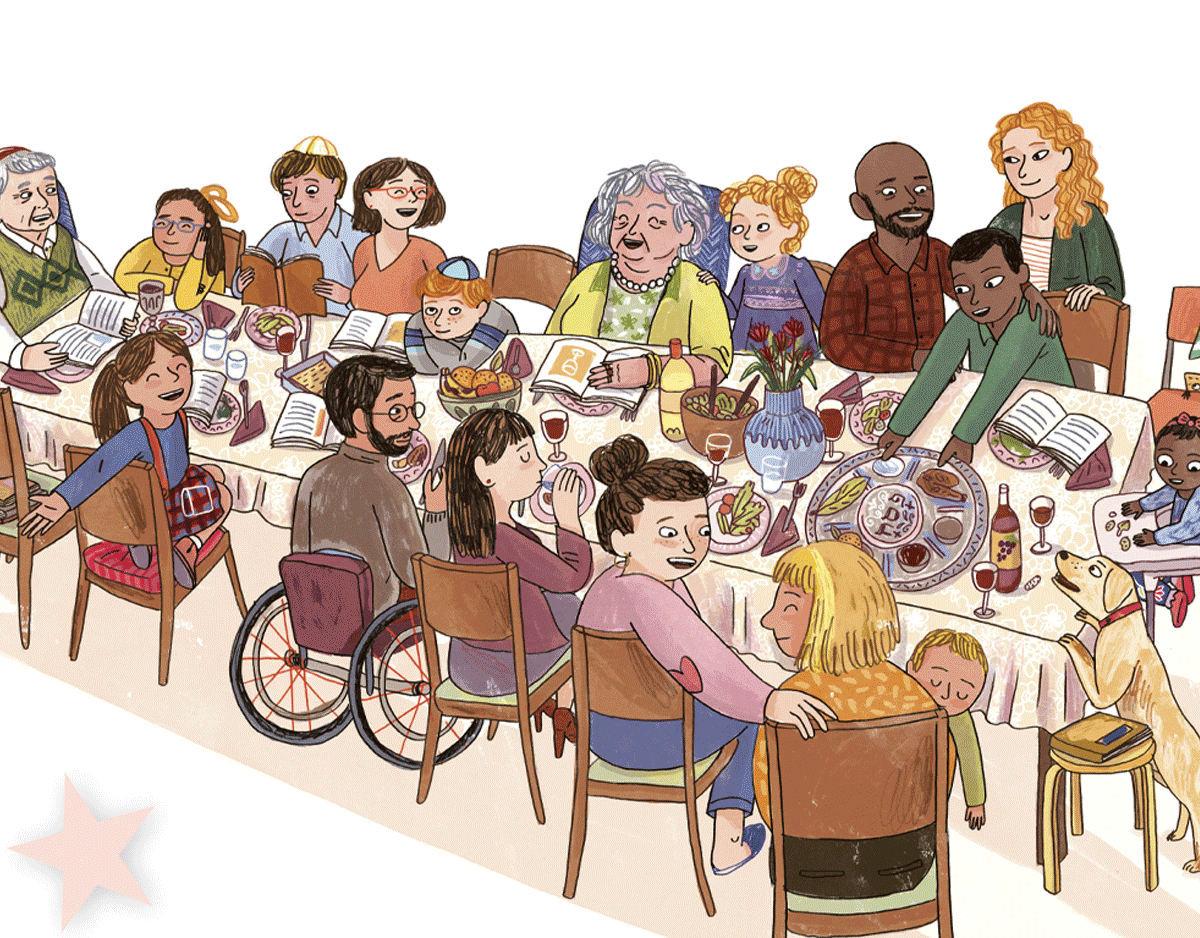SCROLL DOWN TO READ THE POST
Round 1, Match 5: Jepp, Who Defied the Stars vs Starry River of the Sky
 |
|
| Jepp, Who Defied the Stars by Katherine Marsh Hyperion |
Starry River of the Sky by Grace Lin Little, Brown |
Judged by
|
|

I have a problem.
No, it’s not that I can’t choose between Jepp, Who Defied the Stars and Starry River of the Sky. I have a bigger problem than that.
I am supposed to choose which of these two books is better. But I have no idea what “better” means.
I’m not crying wolf here. I’m not just trying to be provocative.
“Better” is a word that can mean just about anything. Does Jepp taste better than Starry River? (No. They taste equally disgusting.) Does Starry River serve as a projectile better? (Yes. It’s nearly square dimensions make it perfect for launching at spouses who interrupt you while you’re trying to figure out what the word “better” means.)
Okay—I’m not trying to be obtuse. I know that saying something is a “better book” does not, usually, mean it’s better for launching across a room.
Nor does it mean that it weighs more, or costs less, or has a smaller carbon footprint.
I wish it did, though. You see, you can measure weight, and price, and carbon footprints. We can all stand around a scale and agree that The Oxford English Dictionary weighs more than Curious George. The reason we can do this is because we have an agreed definition of what “weighs more” means.
We have no such thing for “better.”
Here are some possible definitions of better: Funnier, faster-paced, more emotionally potent, more lyrical, more tightly constructed, more inventive, more ambitious.
Probably we’d all agree that some combination of these judgments comprises “better.”
But how do we balance them? Do we have an equation? Such as:
(Funny) + (Fast-paced) + 3(Emotionally Potent) + (lyrical) + 2(tightly constructed) + (inventive) + 0.5(ambitious) = goodness
That would probably be my equation. I think tight construction is more valuable than fast-pacing, and emotional potency is more valuable even than tight construction. But I’m already second guessing myself. Is tight construction really two times more valuable than inventiveness? I’d have to think more about it.
And this (ridiculous) attempt at a definition of “better” brings up an even more obvious problem. I might think that tight construction is more important than inventiveness, but James Joyce would certainly disagree with me. Who’s right? (Don’t just say James Joyce because he’s more famous; that’s not fair; besides, I’m gonna catch up! I know it!).
So we (you, me, James Joyce) value literary attributes differently.
We also judge them differently.
Which is more emotionally potent, Where the Wild Things Are or Any Given Goosebumps Title?
Me? I’m for Where the Wild Things Are, because I love books that take an emotional experience and reify it—in this case through beautiful pictures, lyrical prose, and a dream-like narrative. But there are literally MILLIONS of children who would disagree vehemently with me, who love Goosebumps and hold those books close to their chests as they fall into their troubled, nightmarish slumbers. Are you going to tell them that they are wrong? That the emotions that they feel for Goosebumps are somehow less than the love I feel for Where the Wild Things Are? I certainly would do no such thing. Because children are terrifying little creatures, and they would kill me.
Okay, so not only do we not have an agreed upon definition of what makes something “better” (2 x emotional potency? 3 x?); even if we did have such a definition, we could not just look at a scale and determine which book “weighed in” as better. That determination relies upon totally subjective judgments. And not just theoretically subjective, like, “Is theft wrong?” Really subjective, like: if me and Tommy from the second grade started to debate which was better, Where the Wild Things Are or Goosebumps, we would both likely end up shouting at each other through our tears.
Okay, you’re probably saying, but we didn’t ask Tommy to be an SLJ BoB judge. We asked you (and we’re regretting it more with every paragraph that goes by). So go ahead and tell us which book YOU think is better.
Not so fast. Even if I were to develop my definition of “better” to a point of unerring precision; even if I were allowed to evaluate the criteria of “better” on a wholly subjective basis, I would still be unable to make a decision in many, many cases. For example, which gets a higher “emotionally potent” score, King Lear or Othello? I weep like a baby when I read both of them. Which gets a higher “funny” score, Holes or Matilda? I don’t know! It depends on the day I’m reading, the time of day, who I’ve just had a conversation with, and whether I am feeling fat and unlucky or brilliant and unrecognized.
Do we really want our determination of “better” to be dependent on my self image?
In other words, we have a problem.
So I’m not going to decide which book is better. Because, as I hope I have made abundantly, redundantly clear, I don’t believe that saying one book is better than another means anything at all.
What, then, am I going to do? Well, just because we can’t determine which book is better does not mean we can’t talk about how much we love these books.
I realize that “love” is just as subjective as “better,” and that I’m going to have to come up with some way of explaining my “love,” and might end up looking kind of like my ridiculous equation above.
But “love” avoids a couple of the logical pitfalls that “better” succumbs to. First, while there are different reasons to love a book, I do not have to decide which is worth more. Is the book funny? Yes! Is it emotionally potent? Yes! Is it tightly constructed? Yes! So I love it! Easy.
Also, Tommy and I don’t have to shout at each other anymore. He can say that Goosebumps is emotionally potent, and I can say the same for Where the Wild Things Are, and we can both be right. Which is a relief, because I have been reduced to tears by second graders in the past, and it is really, really bad for my self-esteem.
Finally, my personal fickleness and indecision isn’t quite so important when I am not relegating one book to an inferior status. I don’t have to worry about deciding whether Othello is better than Lear, or if Holes is better than Matilda. They’re all freaking awesome. Some days I feel like a fat kid at boot camp, some days I feel like a genius in a skirt, and that’s okay.
My reasons for loving a book do, in fact, overlap quite a lot with the criteria from the equation up there, though let’s take out all the arbitrary multipliers. To recap: I like books that are funny, fast-paced, emotionally potent, lyrical, tightly constructed, inventive, and ambitious. Few books do all of these things, and some books that I love deeply do just one or two, but really, really well. But these are the criteria that make up my holistic assessment, “Did I love this book?” And therefore these are what I’ll be looking for in Jepp, Who Defied the Stars and Starry River of the Sky.
Let’s start with Grace Lin’s Starry River of the Sky. It is the story of a runaway boy named Rendi who has arrived at “Village of the Clear Sky”; the moon has gone missing, strange travelers keep showing up, and Rendi has a mysterious past. The major structural conceit of the novel is that Lin regularly breaks from the narration and has a character tell a tale drawn or inspired from Chinese folklore.
So, did I love it?
Yes.
I loved Lin’s writing. It is simple, clear, suggestive, and moving. She uses similes that are so vivid they should be clichés, but aren’t (though I intend to steal them and abuse them until they are): “Master Chao sighed again, this time a heavy sigh that fell like a stone in water.” Or her description of how a story-teller feels when he can’t come up with a tale: “So while his head was empty, the rest of him was full of anxiety. Even as he filled the oversized buckets with the gourd, his thoughts were turning and twisting like dough deep-frying in oil.” I spend a great deal of each day feeling exactly like that.
So the sentence-level work is very effective. Her chapters, and the stories that interrupt them, are also expertly crafted; Lin manages her pacing and our expectations so that each chapter break makes us smile or sigh. A particular favorite is the scene when Rendi composes a message out of snails for the little girl Peiyi. The end of the chapter reveals that he’s been composing “Peiyi is a melonhead”—but before she sees his message, the snails crawl away. I always felt, as a reader, well taken care of. It made me trust Lin; it made me feel grateful.
The trust was well-founded. The grand construction of Starry River is as thoroughly and carefully planned as Lin’s chapters and sentences are. Every character, every detail that is introduced will play a role in the book’s satisfying conclusion. Open my copy of Starry River and you will find furiously scribbled marginalia that reads, “Wait! Is he…?” and “Just like before!” and “WHAT???? THIS BOOK IS SO TIGHT, YO!”
I took to the book’s main characters right away. The two children are simply sketched—more suggestive outlines than detailed portraits—but they are shaded with deep emotions that I easily identified with. It takes Lin just a moment here and a moment there to make us feel like we know these children, and that we care for them.
It is through these children that Lin explores themes of parental disappointment and parental loss. I’m a sucker for these themes, so I fell for them like a stone in water. (Did I pull that off?)
Final report card for Grace Lin’s Starry River of the Sky
Funny: Not raucously, but sweetly.
Fast-paced: Yes; the simple scenes and stories seem to turn the pages themselves.
Emotionally potent: Very.
Lyrical: Very very. (How’s that for lyrical?)
Tightly constructed: Very very very.
Inventive: The structure of weaving folk tales into one long narrative is, I think, a brilliant move—as anyone who’s read my books would have guessed. And her illustrations, which punctuate the text, feel both traditional and new. (They are, incidentally, knock-out gorgeous).
Ambitious: Not in the grand, sprawling sense. But what attempt to write a serious book not ambitious?
Katherine Marsh’s Jepp, Who Defied the Stars takes place at the very end of the 16th century, in the Spanish Netherlands and Denmark. It tells the story of Jepp, a court dwarf—his “acquisition” by the Spanish Infanta, his life in her retinue, his daring escape, and his attempt to make a life for himself in which he determines his own fate.
Did I love it?
Yes.
First of all, I love this period of history, and this region of Europe in particular; it is the era of Shakespeare, of scientific investigation, of exploration. In a few years, Newton will be born and the Dutch will establish on the isle of Mannahatta one of the first pluralistic, democratic states in the world. This is the early modern world at its most new and exciting—and Katherine Marsh makes us feel it.
I loved Jepp. Which is important, because he is the novel. The book is told from his perspective, and he turns out to be a sensitive and complex youth, someone who feels deeply, keenly, and whom we can easily identify with. At a particularly low moment, he says: “When a child falls down, only his mother can comfort him—her soothing words and caresses seem to him a balm like no other.” I know just how he feels; and he is constantly making me feel that way.
The other characters are vividly drawn, too. Magdalena, his ultimate love interest, is captivating—smart and witty and tough; the opposite of the sweet, melancholic girl Jepp first falls for. The astronomer Tycho, with his imperious manner, copper nose, and pet moose, starts out frightening but quickly becomes both amusing and admirable. Pimm, the court jester, is a classic melodramatic villain; I want to hiss every time he makes an appearance on the page. I could rattle every character in the book off from memory—that’s how vivid they are.
But perhaps the most important element of the book is its central question: Can you defy the stars—as well as your history, your position, your stature—and make what you will out of your life? Jepp’s struggle with this question is absolutely believable. He careens from one conclusion to another, but intelligently, earnestly. He doubts his inner strength from time to time, but we never do; and we are certain that somehow, despite the many vicissitudes of Jepp’s fate, Jepp will indeed chart his own course. When he ultimately does, it is deeply satisfying.
There are a couple of elements of Jepp that I did not love, though, and I think it is my job, as a BoB judge, to discuss them—even though I acknowledge that they are deeply, one-hundred percent, without any question, subjective.
The first is the style in which the book is written. Marsh says in the notes to the book that she “spent a lot of time with the etymological dictionary making sure that the English words [Jepp] spoke were in use before 1600 in order to give his voice a distinctive and antiquated feel.” But Jepp would not have sounded antiquated to himself, nor to the people around him. I kept finding that his ornate and olde-tymey language came between us. For example, when he’s feeling lovesick at the court, he narrates: “I retreated to the library and its many books, searching in the stories of the ages for a cure to my wounded heart. I had never imagined it capable of suffering so grievous an injury and feared this delicate organ would never mend.” For me, the passage’s verbiage mutes its impact.
The second aspect of Jepp that gave me pause was one element of the plot. The central mystery of the book’s first part (spoiler alert!) is how Lia, the beautiful, sorrowful dwarf, got pregnant. The court giant is blamed, and we are led to believe, for a time, that he is indeed the guilty party; after all, he and Lia are in love. But enough hints are scattered that we are not surprised to discover that the pregnancy is the result, instead, of rape by Lia’s superior, the court jester. The rape of a dwarf who is kept, effectively, as a slave, is seriously upsetting; I felt I needed more help in navigating and coping with such a trauma. But I am a writer of Middle Grade fiction. One of my talents is having the sensibilities of a ten year old. More mature readers may have no such problem.
Final report card for Jepp, Who Defied the Stars
Funny: At times. I love Ulf the moose and the fact that Tycho continually loses his nose.
Fast-paced: For me, the language and content made Part One feel slow. Starting with Part Two, and the arrival at Tycho’s castle-observatory, the world becomes thrilling and the story hums.
Emotionally potent: Very. You live, effectively, inside of Jepp’s head for the duration of the book, and his thoughts and metamorphosis is very moving indeed.
Lyrical: Sometimes. Often, I found the language an impediment; and then, Marsh would write a sentence that would make me marvel.
Tightly constructed: Deceptively so. The book feels epic and sprawling at first, but by the final turn, you realize that every character has a role to play. The conclusion is tight and satisfying indeed.
Inventive: Absolutely. Setting a novel in the mind of a seventeenth century dwarf—and pulling it off—is as unexpected as it is compelling.
Ambitious: From the setting to the language to the central question, every element of this novel is ambitious. Ambitious is the word for it.
So which book wins? Oy. How am I supposed to know?
As I said, I loved them both. Yes, I had more problems with Jepp than with Starry River. But that doesn’t mean anything. I have more problems with my brother than I do with some dude I knew in high school, too. I still love my brother more.
I’m tempted not to choose at all. One isn’t “better” in any objective sense. And today I might love one book more, and tomorrow the other.
But I will choose. Because, it turns out that, despite my objections at the outset, there has been some value to this exercise. I might not have read either Jepp or Starry River had I not been asked to judge, and I certainly would not have given them such close readings. You see, while I totally do not believe in saying that one book is “better” than another, I absolutely believe in reading books carefully and talking about how much we love them, and why. Because in reading a book closely, in taking the whole novel into your mind and flopping it over and turning it around and trying to chew it and hurl it across the room at your wife, you discover secrets—and not only the book’s.
I did not know that Jepp’s line about mothers would make me cry. Why did it? Well, I’ve figured that out, but I’m not telling anyone except my analyst.
And when Old Mr. Shan, in Starry River of the Sky, looks up and his eyes are suddenly bright and clear, and he says, “I remember everything now. The secret to peace is…” Well, I won’t give it away. But let’s just say I had to put the book down and reconsider a thing or two about myself and my family.
So while deciding which book is “better” means just about nothing at all, this exercise has proven very valuable indeed; for, it turns out, to analyze a book is to analyze oneself.
I can’t deny the next judge that, can I?
So I have to choose.
(And Adam chose Starry River of the Sky to advance to the next round of the 2013 Battle of the Kids’ Books, in a top secret note delivered to our super private judge wrangler’s desktop.)
— Adam Gidwitz
And the Winner of this match is……
STARRY RIVER OF THE SKY

There were an awful lot of books this past year that alluded to stars in the title. Three of them made it into BOB, two of them—FAULT and JEPP—were inspired by the same Shakespeare quote, and the third one—STARRY RIVER OF THE SKY—wins here to advance to the next round. Given that Adam’s novels are quite close in spirit to Lin’s (that is, the weaving of fairy tales into a larger narrative), this judging assignment was somewhat surprising, but as Kathi showed us earlier, that can work for or against a book. I don’t share Adam’s concerns about JEPP, but to my mind these are close enough that I can live with either book, and this decision now sets up a middle grade showdown with the winner of SPLENDORS AND GLOOMS vs. LIAR & SPY, arguably the most anticipated match of the first round.
— Commentator Jonathan Hunt

Final Report Card for Mr. Gidwitz’s Decision:
Funny: Hilarious, both in its length and in the quips that you make. I very much agree that Starry River of the Sky was cutely humorous, and some parts of Jepp were as well.
Fast-paced: Not particularly. You want to read on, but can be overwhelmed by it. And yes, with Grace Lin’s book, you simply want to see where her magical stories will take you. On the other hand, the verbosity of Marsh’s language and a slow-moving and/or tragic plot in some places does prohibit the connectivity somewhat.
Emotionally potent: Well, this isn’t really that type of writing. Starry River is very profound, at least for me, as Lin expertly points out the significance and simple truth of stories, tales that we may not know and are foreign to us but are of the utmost meaning. (The title agrees.) And she does this in the shell of a heartwarming, accessible children’s tale! Marsh also touches on the very important question of fate and creates heartwarming characters in Jepp and Magdalena.
Lyrical: Again, not really the situation for it, but “like a stone in water” is excellent, Mr. Gidwitz, although Lin really gets the credit for it, and also for a nice flow to her language and beautiful comparisons. Jepp is not particularly lyrical but it has its gems, as you correctly noted.
Tightly constructed: It could be less long-winded and more concise, but that would lessen the hilarity of your judgement. I agree that Starry River is compact and has no loose ends, while Jepp seems more long-winded, because of the language. On that note, Mr. Gidwitz, that problem with Jepp is stylistic and therefore subjective; for some, it might be a nice addition to the 16th century feel. Your other complaint is valid, I think; Lia’s rape is awkward and slightly overdone.
Inventive: I think both of the books, and your own presentation of your decision, are all very inventive.
Ambitious: Yours is very ambitious, and also very in sync with your writing style (A Tale Dark and Grimm!). Because of my love for the importance of Starry River, I think it’s extremely ambitious, and so is Jepp, of course.
Decision: Your choice, Mr. Gidwitz, of Starry River, is something I completely agree with. You’re both lucky and unlucky that this was a relatively equal match-up. (It’s fair! You can’t choose!)
— Kid Commentator RGN
About Battle Commander
The Battle Commander is the nom de guerre for children’s literature enthusiasts Monica Edinger and Roxanne Hsu Feldman, fourth grade teacher and middle school librarian at the Dalton School in New York City and Jonathan Hunt, the County Schools Librarian at the San Diego County Office of Education. All three have served on the Newbery Committee as well as other book selection and award committees. They are also published authors of books, articles, and reviews in publications such as the New York Times, School Library Journal, and the Horn Book Magazine. You can find Monica at educating alice and on twitter as @medinger. Roxanne is at Fairrosa Cyber Library and on twitter as @fairrosa. Jonathan can be reached at hunt_yellow@yahoo.com.
ADVERTISEMENT
SLJ Blog Network
2024 Books from Coretta Scott King Winners
Monster Befrienders and a Slew of Horror/Comedy: It’s a Blood City Rollers Q&A with V.P. Anderson & Tatiana Hill
Family Style: Memories of an American from Vietnam | Review
From Page to Planet: Inspiring Young Environmental Champions Through Fiction, a guest post by Dana Klisanin
The Classroom Bookshelf is Moving
ADVERTISEMENT
ADVERTISEMENT






